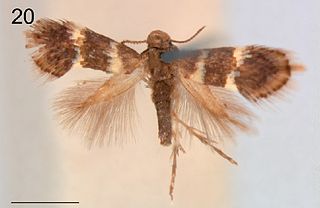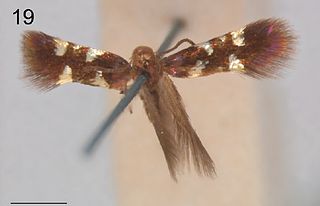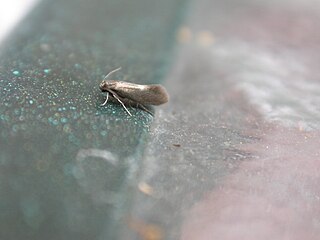Antispila is a moth of the family Heliozelidae. It was described by Hubner in 1825.

Heliozela anna, the jamun leaf miner, is a moth of the family Heliozelidae. It was described by Thomas Bainbrigge Fletcher in 1920. It is found in India, including Bengal.
Antispila argentifera is a moth of the family Heliozelidae. It was described by Annette Frances Braun in 1927. It is found in North America, including Ontario.

Antispila argostoma is a moth of the family Heliozelidae. It was described by Edward Meyrick in 1916. It is found in India.

Antispila aristarcha is a moth of the family Heliozelidae. It was described by Edward Meyrick in 1916. It is found in India.
Antispila aurirubra is a moth of the family Heliozelidae. It was described by Annette Frances Braun in 1915. It is found in the US state of California.
Antispila chlorosema is a moth of the family Heliozelidae. It was described by Edward Meyrick in 1931. It is found in Chile.
Antispila eugeniella is a moth of the family Heliozelidae. It was described by August Busck in 1900. It is found in the US state of Florida.
Antispila freemani is a moth of the family Heliozelidae. It was described by Lafontaine in 1973. It is found in North America, including Ontario and British Columbia.
Antispila inouei is a moth of the family Heliozelidae. It was described by Kuroko in 1987. It is found in Japan.
Antispila isorrhythma is a moth of the family Heliozelidae. It was described by Edward Meyrick in 1926. It is found in India.
Antispila merinaella is a moth of the family Heliozelidae. It was described by Paulian and Viette in 1955. It is found on Madagascar.
Antispila mesogramma is a moth of the family Heliozelidae. It was described by Edward Meyrick in 1921. It is found in Peru.
Antispila nolckeni is a moth of the family Heliozelidae. It was described by Philipp Christoph Zeller in 1877. It is found in Colombia.
Antispila orthodelta is a moth of the family Heliozelidae. It was described by Edward Meyrick in 1931. It is found in Brazil.
Antispila pentalitha is a moth of the family Heliozelidae. It was described by Edward Meyrick in 1916. It is found in Guyana.
Antispila praecincta is a moth of the family Heliozelidae. It was described by Edward Meyrick in 1921. It is found in Brazil.
Antispila tateshinensis is a moth of the family Heliozelidae. It was described by Kuroko in 1987. It is found in Japan.
Antispila trypherantis is a moth of the family Heliozelidae. It was described by Edward Meyrick in 1916. It is found in Guyana.
Antispila uenoi is a moth of the family Heliozelidae. It was described by Kuroko in 1987. It is found in Japan. In 2018, the species was found from China.




